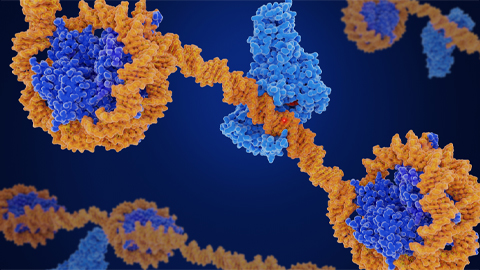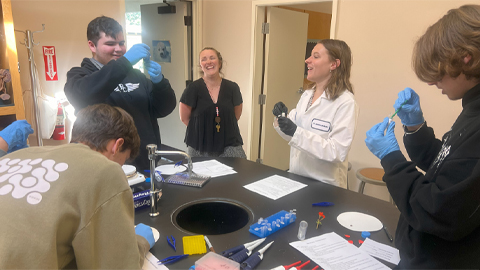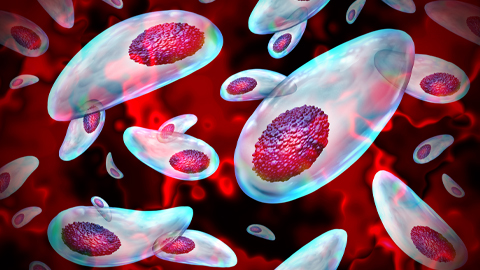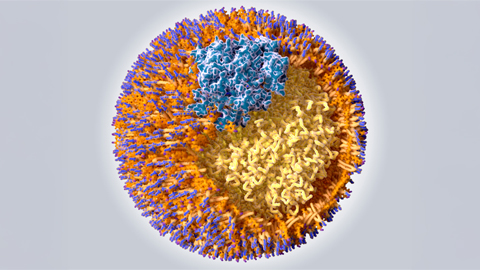Lipoprotein(a): Silent killer or crystal ball?
Lipoproteins are made up of lipids and the proteins that transport lipids. Lipoproteins in the blood shuttle lipids such as cholesterol and triglycerides from the intestine to tissues throughout the body.
Lipoprotein (a), or Lp(a), consists of cholesterol and two proteins, Apo-B 100 and Apo(a). High levels of Lp(a) accelerate the buildup of cholesterol on artery walls, increasing a person’s risk for acute coronary syndrome, or ACS, a blanket term for several diseases associated with sudden reduced blood flow to the heart. In the U.S., ACS affects 15.5 million people and is a leading cause of death.

Elena Aikawa’s lab at Brigham and Women’s Hospital in Boston focuses on studying the drivers of ACS and finding diagnostic biomarkers to identify populations at risk for cardiovascular diseases. In a collaborative study with Pawel Szulc’s lab at the University of Lyon published in the Journal of Lipid Research, postdoc Francesca Bartoli–Leonard and a team of researchers assessed whether a relationship exists between high levels of Lp(a) and ACS in older men.
“With the American Heart Association estimating a person has a heart attack every 41 seconds, it’s imperative we as scientists investigate how to predict these events in patients before they happen,” Bartoli–Leonard said.
The Lp(a) levels in the blood are determined by variations in the LPAgene locus. Hence even individuals with healthy diet and exercise habits may be at high risk for ACS if they have genetic variants that produce high Lp(a) levels.
“Unfortunately, the guidelines from the American Heart Association only suggest clinicians measure lipoprotein(a) in individuals with hypercholesterolemia,” Bartoli–Leonard said, “meaning there are large parts of the American population who may be at risk for lipoprotein(a)-driven cardiovascular disease who are simply unaware.”
Doctors manage ACS with apheresis, a filtering process that removes Lp(a) particles from the blood. No drugs are approved for reducing Lp(a) levels; however, some therapies are currently in clinical trials.
“Clinical treatment for cardiovascular disease can be costly,” Bartoli–Leonard said. “We wanted to find a marker that could be assessed once, and for a relatively low cost, that may help stratify which patients will have a coronary event.”
To determine risk, the team tracked Lp(a) in 755 men over age 60 who live in the same community, following their coronary events and overall health for up to eight years. The researchers report that participants with blood Lp(a) levels higher than 50 milligrams per deciliter had an increased incidence of ACS.
For, this investigation, only Caucasian males living in France were recruited in the study population. “However, these results are consistent with reports that included more diverse ethnic backgrounds and those assigned female at birth," the authors wrote in the paper.
The study provides further evidence that Lp(a) levels predict the likelihood of a coronary event independent of common risk factors such as smoking, body mass index and cholesterol levels.
“We hope that our work, alongside with the other studies, which also look at Lp(a) in the general population, encourage the health care providers to assess Lp(a) routinely in the clinic,” Bartoli–Leonard said.
Enjoy reading ASBMB Today?
Become a member to receive the print edition four times a year and the digital edition monthly.
Learn moreGet the latest from ASBMB Today
Enter your email address, and we’ll send you a weekly email with recent articles, interviews and more.
Latest in Science
Science highlights or most popular articles

CRISPR epigenome editor offers potential gene therapies
Scientists from the University of California, Berkeley, created a system to modify the methylation patterns in neurons. They presented their findings at ASBMB 2025.

Finding a symphony among complex molecules
MOSAIC scholar Stanna Dorn uses total synthesis to recreate rare bacterial natural products with potential therapeutic applications.

E-cigarettes drive irreversible lung damage via free radicals
E-cigarettes are often thought to be safer because they lack many of the carcinogens found in tobacco cigarettes. However, scientists recently found that exposure to e-cigarette vapor can cause severe, irreversible lung damage.

Using DNA barcodes to capture local biodiversity
Undergraduate at the University of California, Santa Barbara, leads citizen science initiative to engage the public in DNA barcoding to catalog local biodiversity, fostering community involvement in science.

Targeting Toxoplasma parasites and their protein accomplices
Researchers identify that a Toxoplasma gondii enzyme drives parasite's survival. Read more about this recent study from the Journal of Lipid Research.

Scavenger protein receptor aids the transport of lipoproteins
Scientists elucidated how two major splice variants of scavenger receptors affect cellular localization in endothelial cells. Read more about this recent study from the Journal of Lipid Research.

